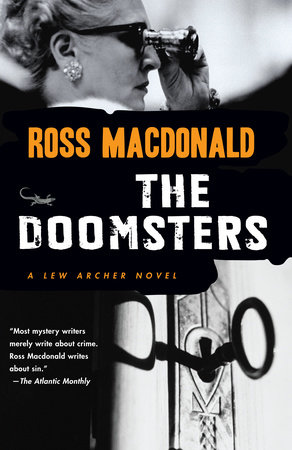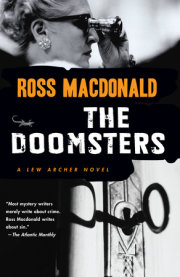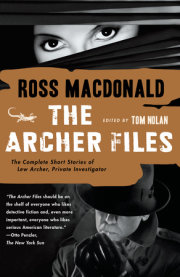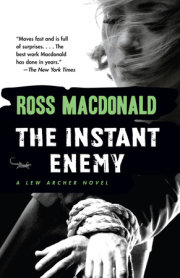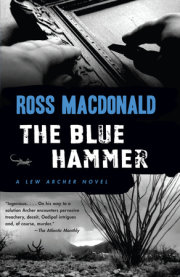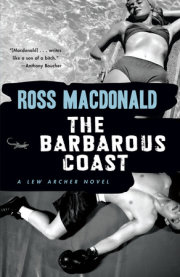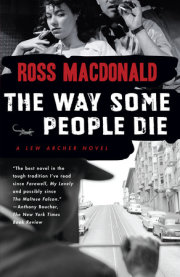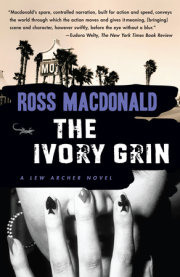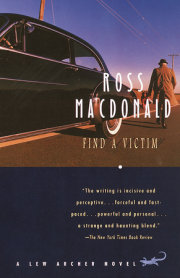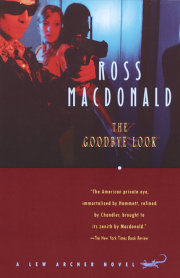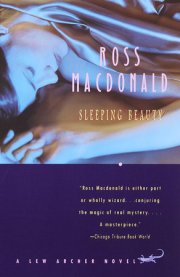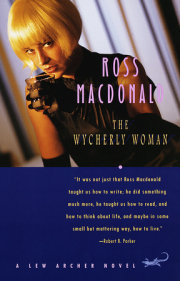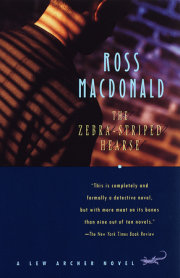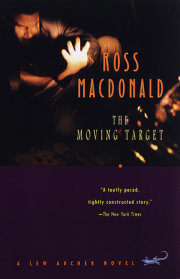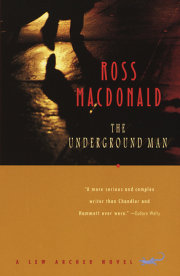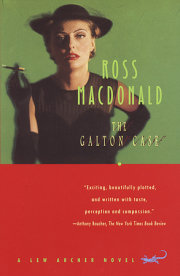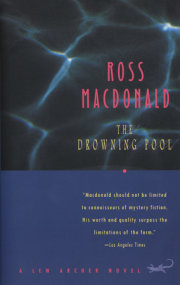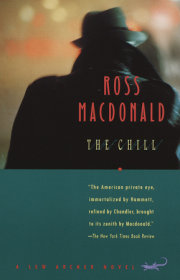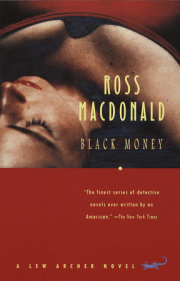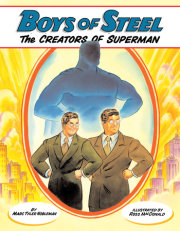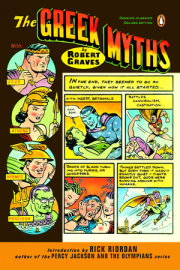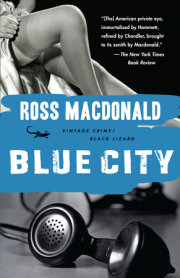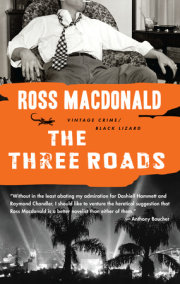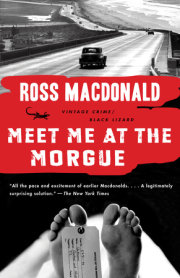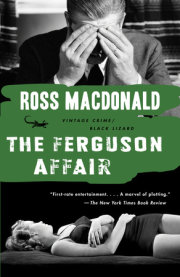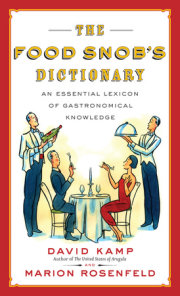chapter 1I WAS dreaming about a hairless ape who lived in a cage by himself. His trouble was that people were always trying to get in. It kept the ape in a state of nervous tension. I came out of sleep sweating, aware that somebody was at the door. Not the front door, but the side door that opened into the garage. Grossing the cold kitchen linoleum in my bare feet, I saw first dawn at the window over the sink. Whoever it was on the other side of the door was tapping now, quietly and persistently. I turned on the outside light, unlocked the door, and opened it.A very large young man in dungarees stepped awkwardly backward under the naked garage bulb. There was dirt in his stubble of light hair. His unblinking pale blue eyes looked up at the light in an oddly pathetic way."Turn it off, will you?""I like to be able to see.""That's just it." He glanced through the open garage door, out to the quiet gray street. "I don't want to be seen.""You could always go away again." Then I took another look at him, and regretted my surliness. There was a kind of oily yellowish glaze on his skin which was more than a trick of the light. He could be in a bad way.He looked again at the hostile street. "May I come in? You're Mr. Archer, aren't you?""It's kind of early for visiting. I don't know your name.""Carl Hallman. I know it's early. I've been up all night." He swayed, and steadied himself against the doorpost. His hand was black with grime, and there were bleeding scratches on the back of it."Been in an accident, Hallman?""No." He hesitated, and spoke more slowly: "There was an accident. It didn't happen to me. Not the way you mean.""Who did it happen to?""My father. My father was killed.""Last night?""Six months ago. It's one of the things I want to ask you--speak to you about. Can't you give me a few moments?" A pre-breakfast client was the last thing I needed that morning. But it was one of those times when you have to decide between your own convenience and the unknown quantity of another man's trouble. Besides, the other man and his way of talking didn't go with his ragbag clothes, his mud-stained work shoes. It made me curious."Come in then."He didn't seem to hear me. His glazed eyes stayed on my face too long."Come in, Hallman. It's cold in these pajamas.""Oh. Sorry." He stepped up into the kitchen, almost as broad as the door. "It's hellish of me to bother you like this.""No bother if it's urgent."I shut the door and plugged in the coffee-maker. Carl Hallman remained standing in the middle of the kitchen floor. I pulled out a chair for him. He smelled of country."Sit down and tell me about it.""That's just it. I don't know anything. I don't even know if it is urgent.""Well, what's all the excitement about?"I'm sorry. I don't make much sense, do I? I've been running half the night.""Where from?""A certain place. It doesn't matter where." His face closed up in blankness, almost stuporous. He was remembering that certain place.A thought I'd been suppressing forced its way through. Carl Hallman's clothes were the kind of clothes they give you to wear in prison. He had the awkward humility men acquire there. And there was a strangeness in him, stranger than fear, which might be one of guilt's chameleon forms. I changed my approach:"Did somebody send you to me?""Yes. A friend gave me your name. You are a private detective?"I nodded. "Your friend has a name?""I don't know if you'd remember him." Carl Hallman was embarrassed. He popped his dirty knuckles and looked at the floor. "I don't know if my friend would want me to use his name.""He used mine.""That's a little different, isn't it? You hold a--sort of a public job.""So I'm a public servant, eh? Well, we won't play guessing games, Carl."The water in the coffee-maker boiled. It reminded me how cold I was. I went to my bedroom for a bathrobe and slippers. Looked at the gun in my closet, decided against it. When I came back to the kitchen, Carl Hallman was sitting in the same position."What are you going to do?" he asked me dully."Have a cup of coffee. How about you?""No, thanks. I don't care for anything."I poured him a cup, anyway, and he drank it greedily."Hungry?""You're very kind, but I couldn't possibly accept--""I'll fry a couple of eggs.""No! I don't want you to." His voice was suddenly high, out of control. It came queerly out of his broad barrel chest, like the voice of a little boy calling from hiding. "You're angry with me."I spoke to the little boy: "I don't burn so easy. I asked for a name, you wouldn't give it. You have your reasons. All right. What's the matter, Carl?""I don't know. When you brushed me off, just now, all I could think of was Father. He was always getting angry. That last night--"I waited, but that was all. He made a noise in his throat which might have been a sob, or a growl of pain. Turned away from me and gazed at the coffee-maker on the breakfast bar. The grounds in its upper half were like black sand in a static hourglass that wouldn't let time pass. I fried six eggs in butter, and made some toast. Carl gobbled his. I gobbled mine, and poured the rest of the coffee."You're treating me very well," he said over his cup. "Better than I deserve.""It's a little service we provide for clients. Feeling better?""Physically, yes. Mentally--" He caught himself on the downbeat, and held steady. "That's good coffee you make. The coffee on the ward was terrible, loaded with chicory.""You've been in a hospital?""Yes. The State Hospital." He added, with some defiance: "I'm not ashamed of it." But he was watching closely for my reaction."What was the trouble?""The diagnosis was manic-depressive. I don't think I am manic-depressive. I know I was disturbed. But that's all past.""They released you?"He hung his head over his coffee cup and looked at me from underneath, on the slant."Are you on the run from the hospital?""Yes. I am." The words came hard to him. "But it's not the way you imagine. I was virtually cured, ready to be discharged, but my brother wouldn't let them. He wants to keep me locked up." His voice fell into a singsong rhythm: "As far as Jerry is concerned, I could stay there until I rotted."The melody was familiar: incarcerated people always had to be blaming someone, preferably a close relative. I said:"Do you know for a fact your brother was keeping you there?""I'm certain of it. He had me put away. He and Dr. Grantland made Mildred sign the commitment papers. Once I was there, he cut me off entirely. He wouldn't visit me. He made them censor my mail so I couldn't even write letters." The words had been rushing faster and faster, tumbling out of his mouth. He paused and gulped. His Adam's apple bobbed like a ball valve under the skin of his throat."You don't know what it's like being cut off like that, not knowing what goes on. Of course, Mildred came to see me, every chance she got, but she didn't know what it was all about, either. And we couldn't talk freely about family matters. They made her visit me on the ward, and they always kept a nurse there, within hearing. As if I couldn't be trusted with my own wife.""Why, Carl? Were you violent?"Suddenly and heavily, as if I'd rabbit-punched him, his head sank low between his shoulders. I looked him over, thinking that he could be formidable in a violent mood. His shoulders were overlaid with laminated muscle, and wide enough to yoke a pair of oxen. He was saying:"I made a fool of myself the first few days--tore up a couple of mattresses, things like that. They put me in wet packs. But I never hurt anyone. At least I don't remember, if I did." His voice had sunk almost out of hearing. He raised it, and lifted his head. "Anyway, I never stepped out of line after that, not once. I wasn't going to give them any excuse to keep me locked up. But they did. And they had no right to.""So you came over the wall."He looked at me in surprise, his pale eyes wide. "How did you know we came over the wall?"I didn't bother explaining that it was only an expression, which seemed to have hit the literal truth. "More than one of you broke out, eh?"He didn't answer. His eyes narrowed suspiciously, still watching my face."Where are the others, Carl?""There's only the one other," he said haltingly. "Who he is doesn't matter. You'll read about it in the papers, anyway.""Not necessarily. They don't publicize these things unless the escapees are dangerous."chapter 2I LET that last word hang in the silence, turning this way and that, a question and a threat and a request. Carl Hallman looked at the window over the sink, where morning shone unhampered. Sounds of sporadic traffic came from the street. He turned to look at the door he had come in by. His body was taut, and the cords in his neck stood out. His face was thoughtful.He got up suddenly, in a brusque movement which sent his chair over backwards, crossed in two strides to the door. I said sharply:"Pick up the chair."He paused with his hand on the knob, tension vibrating through him. "Don't give me orders. I don't take orders from you.""It's a suggestion, boy.""I'm not a boy.""To me you are. I'm forty. How old are you?""It's none of your--" He paused, in conflict with himself. "I'm twenty-four.""Act your age, then. Pick up the chair and sit down and we'll talk this over. You don't want to go on running.""I don't intend to. I never wanted to. It's just--I have to get home and clean up the mess. Then I don't care what happens to me.""You should. You're young. You have a wife, and a future.""Mildred deserves someone better than me--than I. My future is in the past."But he turned from the door, from the bright and fearful morning on the other side of it, and picked up the chair and sat in it. I sat on the kitchen table, looking down at him. His tension had wrung sweat out of his body. It stood in droplets on his face, and darkened the front of his shirt. He said very youngly:"You think I'm crazy, don't you?""What I think doesn't matter, I'm not your headshrinker. But if you are, you need the hospital. If you're not, this is a hell of a way to prove you're not. You should go back and get yourself checked out.""Go back? You must be cr--" He caught himself.I laughed in his face, partly because I thought he was funny and partly because I thought he needed it. "I must be crazy? Go ahead and say it. I'm not proud. I've got a friend in psychiatry who says they should build mental hospitals with hinged corners. Every now and then they should turn them inside out, so the people on the outside are in, and the people on the inside are out. I think he's got something.""You're making fun of me.""What if I am? It's a free country.""Yes, it is a free country. And you can't make me go back there.""I think you should. This way, you're headed for more trouble.""I can't go back. They'd never let me out, now.""They will when you're ready. If you turn yourself in voluntarily, it shouldn't go against you very hard. When did you break out?""Last night--early last evening, after supper. We didn't exactly break out. We piled the benches against the wall of the courtyard. I hoisted the other fellow up to the top and he helped me up after him, with a knotted sheet. We got away without being seen, I think. Tom--the other fellow--had a car waiting. They gave me a ride part of the way. I walked the rest.""Do you have a special doctor you can see, if you go back?""Doctor!" It was a dirty word in his vocabulary. "I've seen too many doctors. They're all a bunch of shysters, and Dr. Grantland is the worst of them. He shouldn't even be allowed to practice.""Okay, we'll take away his license."He looked up, startled. He was easy to startle. Then anger rose in him. "You don't take me seriously. I came to you for help in a serious matter, and all I get is cheap wisecracks. It makes me mad.""All right. It's a free country.""God damn you."I let that pass. He sat with his head down for several minutes, holding himself still. Finally he said: "My father was Senator Hallman of Purissima. Does the name mean anything to you?""I read in the papers that he died last spring."He nodded jerkily. "They locked me up the next day, and wouldn't even let me go to his funeral. I know I blew my top, but they had no right to do that. They did it because they didn't want me snooping.""Who are 'they'?""Jerry and Zinnie. Zinnie is my sister-in-law. She's always hated me, and Jerry's under her thumb. They want to keep me shut up for the rest of their lives, so that they can have the property to themselves.""How do you know that?""I've had a lot of time to think. I've been puffing things together for six months. When I got the word on Dr. Grantland-- Well, it's obvious they paid him to have me committed. They may even have paid him to kill Father.""I thought your father's death was accidental."
Copyright © 2007 by Ross Macdonald. All rights reserved. No part of this excerpt may be reproduced or reprinted without permission in writing from the publisher.

